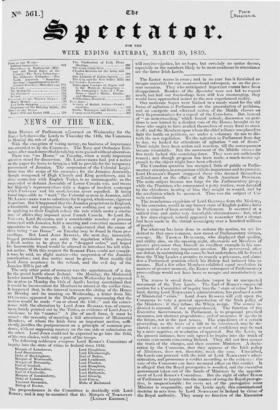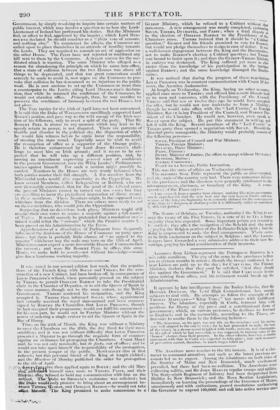The Easter recess is come; and in no year has
it furnished so meagre materials for our semi-sessional retrospect, as on the pre- sent occasion. They who anticipated important events have been disappointed. Readers of the Spectator were not led to expect much, but had our forebodings been still less encouraging, they would have approached nearer to the now experienced reality. Our moderate hopes were limited to a manly stand for the old forms of agitation in Parliament on the presentation of petitions, and an energetic and effectual action of the Middle classes on their Representatives thr a repeal of the Corn-laws. But, instead of ” an understanding," which bound nobody, discussion on peti- tions is now barred be a distinct vote of the House, brought on by those who ought to have availed themselves of every form to stave it off; and the Members upon whom the chief reliance was placed to
fight the battle on petitions, are under a voluntary tie not to dis- turb the new regulation. To the agitation in Parliament from day to day, we looked for stimulants of agitation " out of doors." There might have been action and reaction, till the consequences became formidable. But the movement of the I■liddle classes for free trade lacked this sustaining force. They were not sufficiently roused ; and though progress has been made, a much nearer ap- proach to the object might have been effected.
The Canadian question has occupied little of public or Parlia- mentary attention, in comparison with its importance and its promise. Lord DURHAM'S Report staggered those who deemed themselves well-infhrmed on the affairs of the North American Provinces. The main subject became too large for the Parliamentary grasp ; while the Pharisbes, who commenced a petty warfare, were daunted by the chivalrous bearing of him they sought to wound, and by the retaliation which he menaced. Thus was the subject of Ca- nada cushioned.
The treacherous expulsion of Lord GLENELG from the Ministry, by his comrades, would in any former state of English politics have been a subject of keen scrutiny in Parliament. It occurred at a critical time and under very remarkable circumstances: but, after a few days elapsed, nobody appeared to remember that a change had been made in the virtual sovereignty over a hundred millions of people.
For whatever has been done to redeem the session, we are in- debted to that once common, now rarest of Parliamentary virtues, courage. Mr. Tuostss DuNeostnE, who displayed that quality, and ability also, on the opening night, afterwards set Members of greater pretension than himself an excellent example in his ma- nagement of a not very important question. lie persevered, after one defeat, in maintaining the cause he had undertaken, till he forced from the Whig Leader a promise to remedy a grievance, and aban- don a Puritanical position which his Bishop had induced him to assume. Had a few other Members exhibited equal resolution in matters of greater moment, the Easter retrospect of Parliamentary proceeedings would not have been so meagre and unsatisfitctory as it is.
The recess is saved from absolute torpor by an unexpected movement of the Tory Lords. The Earl of lionres's successful motion for a Committee of' inquiry into the "state Of crime" in he- land, during Lord NORMANItY S administration, has produced a sort of Ministerial " crisis." Lord Jonx 14a:sr:Lt. will call upon the Commons to vote a general approbation of the Irish policy of the _Ministers : if they refuse, the Whigs resign. The course in- dicated is unusual, if not unprecedented. The fenction of the Executive Government, in Parliament, is to propound practical measures, not abstract propositions ; and of' measures it speaks in the future, not in the past tenses. The expediency of a certain proceeding, as the basis of' a bill to be introduced, may be de- clared; or a motion of censure or want of contidenve mav be met by a mere negative, or resolution of approN;t1. But the Lords, iii the present instance, have only agreed to inquire into the truth of certain statements concerning Ireland. They did not first assume the truth of the charges, and then censure Ministers. A decla- ration by the (7ommons, that they- approve of' the Irish policy of Ministers, does not, therefore, meet the case, Unscathed, the Lords can proceed with the trial of Lord NOHMANHY'S Min& nistration, anti pronounce a verdict according to the evidence : the vote of' the Commons can have no moral effect on this verdict. It is alleged that the Royal prerogative is assailed, and the executive government taken out of the hands of Ministers by the appoint- ment of Lord RonuN's Committee. But the right of either House of Parliament to inquire into the manner of using the Royal preroga- tive, is unquestionable : thr every act of the prerogative some Minister is responsible, and the Lords apply this constitutional doctrine to acts done by Lord NoastaxitY in Ireland by virtue of the Royal authority. They usurp no function of the Executive.
Government, by simply resolving to inquire into certain matters of public interest, which may involve a question as to how the Lord- Lieutenant of Ireland has performed his duties. But the Ministers feel, or affect to feel, aggrieved by the inquiry ; which Lord MEr.- BOURNE declared he should consider-as a "plain vote of censure, and nothing else." To counteract its effects, the Commons are called upon to place them:wives in an attitude of hostility towards the Lords. They are required to commit an act of aggression on the other House. The Peers have not rejected or mutilated any bill sent to them by the Commons. A decent excuse for the me- ditated attack is wanting. The same Minister who alleged as a reason for abandoning the principle on which he came into office, that a state of collision between the two Houses was above all things to be deprecated, and that too great concessions could scarcely be made to avoid it, now urges on the Commons to pro- voke that collision he has denounced as so injurious to the public
weal. He is now anxious to set up the Conunons as more than a counterpoise to the Lords; citing Lord MELBOURNE:S declara-
tion, that while he retained the confidence of the Commons, he would not abandon office. Principle, then, be may sacrifice to preserve the semblance of harmony between the two Houses, but not pktee.
The Tory tactics for the 15th of April have not been announced. It is said that the Duke of WELLINGTON unwillingly supported Lord
RoDEN's motion, and gave way to the wild energy of the Irish sec-
tion of his followers, only to avert a split of the party. That Sir Ronuar PEEL is averse to any measure which may lead to his
speedy return to power, is not disputed. There are portents of trouble and disaster in the political sky, the dispersion of which he ',you'd fain witness before he again incur the responsibility of steering the state vessel. Especially must he wish to avoid
the resumption of office as a supporter of the Orange policy. He is therefore embarrassed by Lord JOHN RUSSELL'S chal-
lenge to meet him on Irish ground ; and it seems to be ex- pected that he will take up a different position, and, by moving an amendment expressing zeneral want of confidence in the present Government, turn the Whig Leader's Parliamentary tactics against himself. For such a motion might possibly be carried, Numbers in the House are very nearly balanced when
both parties muster their full strength. A few seceders from the
Minisn!rial ranks would give superiority to the Opposition. We know several Members, celled Independent or Radical, who are now tiniroughly convinced, that tisr the _good of the Liberal cause, the present Ministers cannot be turned out too soon ; but they are unwilling to incur the prejudiced imputation of direct agency Ill thsis overthrow. These Members might, ill the supposed case, withdraw from the divishm. There are others more ready to act on tIn•ic convictions, who would join the Opposition.
Supposing that no desertions took place' Ministers would still require their own votes to secure a majority against a full muster
of Tories. It would scarcely be pretended that a resolution so era. tabled would rebut the " censure" which the Premier asserts lies been passed on his Administrn t ion by the Peers.
Apprehensions of a dissohnion of Parliament have frequentiv influenced t he decisions of the house of Commons on party ques-
tions : but there is probably little chance of " an appeal to the country" whichever way the scale may turn on the 1 rith of .April. Ministers cannot expect a more favourable House of Commons than
the psesent ; and wore Sir ROBERT PEEL in office, this same liousss, we make bold to assert—not without knowledge—would give him a handsome working majority.



























